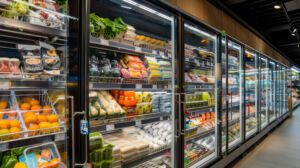Every year, supermarkets around the world waste approximately 930 million tonnes of food, according to the UN. In the US alone, this represents more than $18 billion in annual losses due to expired or mismanaged products. At the same time, consumers and authorities are increasingly demanding sustainable practices, including reusable packaging solutions and full product traceability.
Against this backdrop, what is RFID becomes a relevant question, as the technology is establishing itself as a key tool. Its ability to track products individually and in real time is helping to transform the way food companies effectively manage inventory, reduce waste, and adopt reusable packaging. In this post, we look at how RFID tech can help and what the main challenges are for the industry.
Why RFID Tech Matters in the Food & Beverage Sector
The food and beverage industry faces increasingly complex structural challenges - from accurate inventory management to the need to adopt sustainable practices throughout the supply chain. According to a report by the Food and Agriculture Organization (FAO), approximately 14% of the world's food is lost before it reaches the point of sale, and much of that loss is due to logistical inefficiencies and lack of traceability.
Unlike traditional barcodes, RFID systems allow products to be identified and tracked in real time, without direct visual contact, and across multiple units at the same time. This is especially useful for perishable products, where continuous visibility of inventory is key to avoiding wastage and stock-outs.
In addition, RFID enables the implementation of circular economy strategies, such as the use of reusable and returnable packaging, by providing accurate lifecycle tracking of each unit. Large retailers and food manufacturers are already incorporating this technology to reduce costs, improve regulatory compliance and respond to consumer pressure for greater transparency.
RFID thus becomes not only a tool for improving operational efficiency, but also a technology pillar for sustainability and consumer confidence.

Reusable Packaging: The New Standard in Sustainability
The use of reusable packaging is becoming a key part of the transition towards sustainable models, especially in sectors such as food and beverages. More and more countries and companies are taking concrete steps to reduce waste and promote the circular economy. France, for example, has committed to eliminate single-use plastic packaging by 2040 through AGEC N° 2020-105.
In this scenario, Checkpoint Systems is driving solutions that enable more efficient management of waste from mass consumption. Our reusable packaging solution, based on RFID tech, ensures full traceability throughout the product life cycle. This technology allows objects to be identified and tracked remotely and with high accuracy, facilitating intelligent inventory management, optimising replenishment and minimising waste.
Applied in the food sector, the RFID solution enables the tagging of packaging at source, monitoring its use throughout the operational process and managing its return without affecting the customer experience. This ensures not only operational efficiency, but also a real contribution to sustainability and the circular model.
Tracking and Traceability with RFID Tech
The beverage sector faces several key challenges in terms of traceability and inventory control. Unlike other products, many beverages, especially alcoholic beverages, require strict tracking for regulatory issues, authenticity and prevention of theft or counterfeiting. In addition, the variety of formats, packaging materials and storage conditions further complicates the implementation of technologies such as RFID.
However, thanks to innovative solutions such as BottleID™ from Checkpoint Systems, each bottle - be it wine, champagne or spirits - can have a unique digital identity, making it easy to track throughout the entire supply chain, from the producer to the point of sale. This technology not only improves transparency and logistical efficiency, but also helps manufacturers and retailers combat counterfeiting and enhance the customer experience with authenticated products.
In turn, RFreshID™ enables retailers to manage fresh produce more accurately, reducing waste through detailed control of turnover and expiry dates for each item. This is particularly useful for perishable beverages, such as fresh juices, smoothies or dairy products, where proper stock management is key to minimising losses and ensuring quality for the end consumer.
Key Operational Benefits for Food Companies
The operational advantages of implementing RFID in the F&B sector are manifold:
- Reduced inventory shrinkage: RFID allows for individual item tracking, helping food companies reduce unknown losses by identifying and addressing discrepancies more accurately.
- Increased real-time visibility: With real-time inventory data, RFID provides greater control and transparency across the supply chain, enabling faster, data-driven decisions.
- Optimisation of the supply chain, by enabling efficient rotation of fresh products.
- Automation of counting and verification tasks to optimize resources and allow employees to focus on higher-value activities like customer service.
- Improved customer experience, with more accurate availability and guaranteed freshness.
Real-World Applications of RFID Tech
Industry companies are already adopting these technologies with tangible results:
- Supermarkets implementing RFreshID™ have been able to reduce food waste in fresh produce and streamline their daily operations.
- Premium beverage brands are using BottleID™ to ensure product authenticity, control distribution and enhance the consumer experience with on-pack digital information.
- Restaurants are implementing the reusable packaging solution through RFID because it allows them to monitor usage throughout the operational process and manage its return without impacting the customer experience.

What’s Next for RFID in Sustainable Food Supply Chains?
The future of RFID tech in the F&B sector is promising. As regulatory pressure and consumer demand for sustainable practices grows, RFID is positioned as a key enabler of smart, circular supply chains. Traceability from source to shop, the drive for reusable packaging and continuous process optimisation will lead the way to a more efficient and responsible industry.
